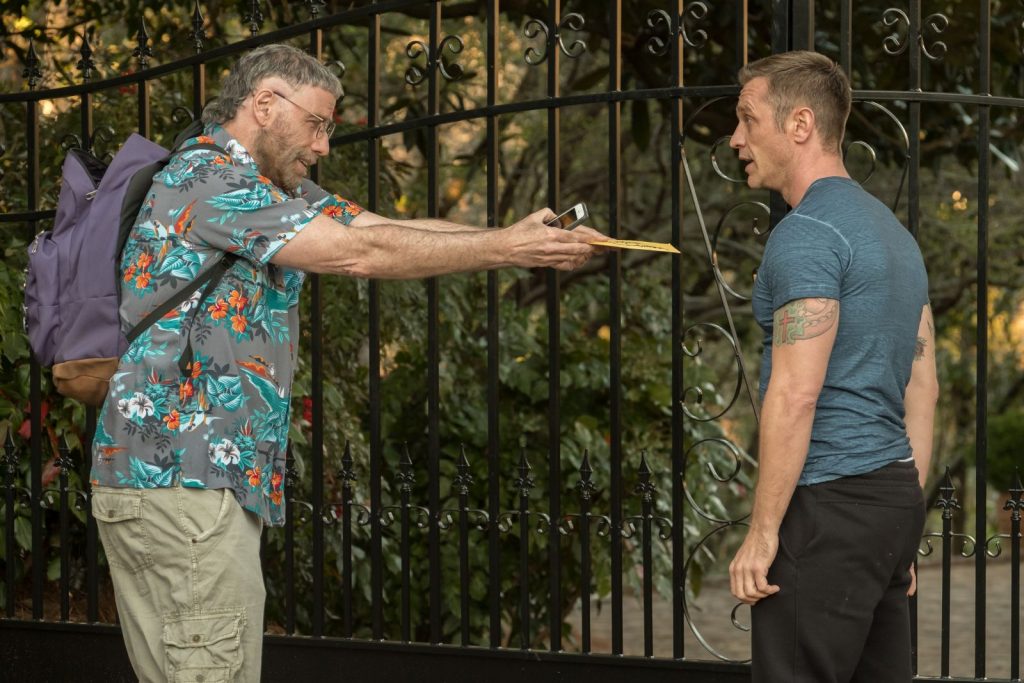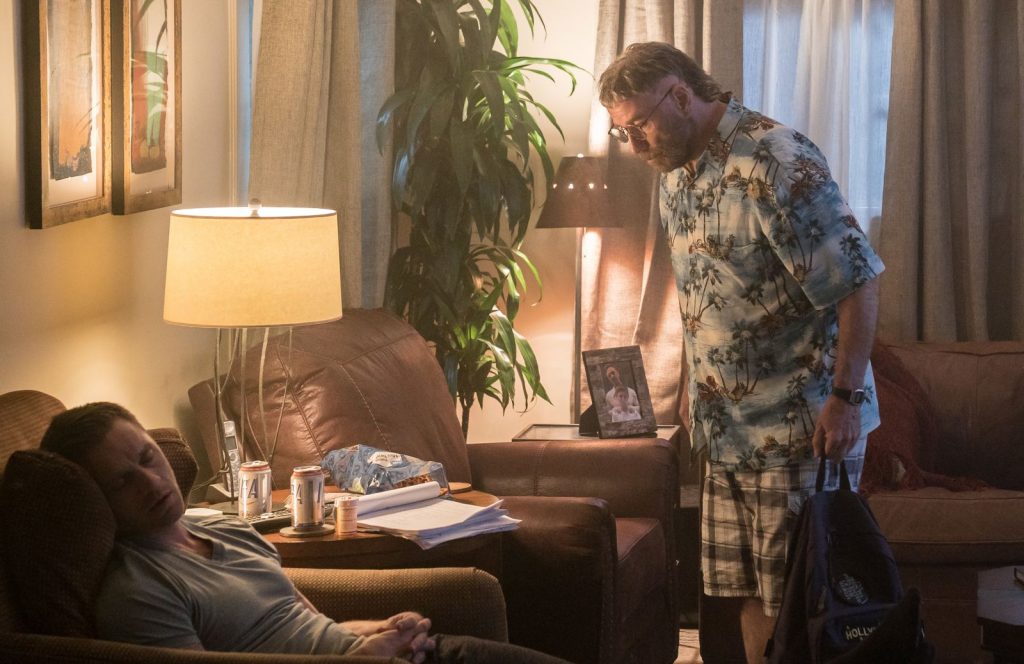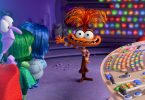John Travolta is one of the biggest celebrities in Hollywood so he knows a thing or two about fan and celebrity culture. His latest role examines what happens when that culture is taken to the extreme levels. In The Fanatic he plays Moose, a passionate fan of Hollywood action star Hunter Dunbar, played by Devon Sawa, who doesn’t take no for an answer and will do whatever it takes to get an autograph from him. We sat down with Travolta to talk about how he prepared for such an unique role and how fandom and passion are tied together.
The Fanatic opens this Friday in Atlanta exclusively at AMC Sugarloaf and SMG Marietta.
How did you get involved with this project? How did you first hear about it and decide you wanted to be a part of it?
John Travolta: Fred Durst met with me, I thought it was about 15 years ago, could be less, and he was interested. He was at the peak of his Limp Bizkit fame, and he was interested in getting involved in film. We discussed, much like I did with Quentin [Tarantino], all night we talked about film, acting, music, and then years later he finally out of nowhere calls me and says it’s Fred Durst, and I said, “Boy I haven’t heard from him in a long time.” So I called him back and he said, “I have this script.” He said, “It’s really good, John. I think you’re going to respond to it and really want to do it.” I said, “Well I hope so, but let’s look.” So he sent it, and I just went crazy for it. I just understood it; knew what we could do with it. He had a vision that was so articulate and so specific that I knew he was gonna kinda kill it, you know. And he did. And I was very, very proud of him and us. That’s how it happened.
Did you always want to play Moose? Was there any discussion in who you would play, whether it would be him or the celebrity?
Travolta: No, no, I think he and I always knew it was Moose. The celebrity, I could have played him, but I had a feeling about Moose. I’m basically a character actor that pretends to be a leading man so I just wanted to do that anyway. The real thing was who do you find to be that perfect movie star? That was the hardest part. Because is it a Stalone? Is it a Schwarzenegger? Who is this guy? Devin [Sawa] was just perfect because he’s so angry and so chip on his shoulder. He’s a good person but a bad celebrity, like that kinda guy. And Moose is so…you know, I’m a fan too. We’re all Moose to some degree. Who did you love growing up?
Ohhh…
Travolta: Pick somebody.
Mine was Zach Braff from Scrubs and I actually got to meet him.
Travolta: Okay. So now Moose has that feeling about this guy except that because he’s on the spectrum to some degree he’s not calculating it as logically as others might, and so when he gets punished for loving him he gets confused. It’s light a juggernaut that builds up. Moose is all of us but misled and on steroids about celebrity. But it doesn’t mean that I don’t understand the core of him, which is adoring someone so deeply that you can’t stand it. That you are inconsolable about how much you love that person. Even in the beginning, if you remember it, when he says he’s coming to the shop the next night Moose freezes. He can’t…he’s dreaming. He can’t believe it. “Why didn’t you tell me?” And then when he sees him for the first time, and it goes into that dream-like thing. We’ve all felt that way about people.
Who is your someone you would fan over?
Travolta: Oh I have many. I had James Cagney. I had Paul McCartney. I had Barbra Streisand. I had Marlon Brando. I had a good handful of people that could discombobulate me to some degree. I understood this feeling, and now you just take it to the limit, and you nuke the line. But don’t forget the movie star’s nuking the line too because the tire’s flat and he’s kicking the cat. He’s blaming Moose for the bad relationship with his ex-wife, with his career. He’s just taking it all out on Moose. Two wrongs don’t make a right, you know? They’re both good people, but they’re both misguided. But if it was just a normal situation there wouldn’t be a movie so we had to make it this way.

You captured so many little details of this character like the pulling on the ear and smelling it and all these little things that you did. Can you talk a little bit about the mental health of the character, but then also your preparation to take that on?
Travolta: Firstly, the script invited this kind of behavior that could not be justified with a regular behaving person. So I said to, because Fred said he might be slightly Asperger’s, and I said he’s got to be a little more than that because he’s not really clocking the idea…because when you’re an actor and you look through the through-line you say, I don’t want you to tell the plot, but how do you kill the maid and then not realize you’ve killed her? Then you talk to a body that’s unconscious, “You put cotton up there,” and then, “oh, nosebleeds are bad.” He’s telling her, he’s giving her instructions. You got to be a little bit there in order to then be distracted by a chime and then go into the house like nothing ever happened. Or take pictures with him while he’s sleeping, kiss him, cuddle with him while he’s tied up; all those things you’ve got to go somewhere different. And I thought how do I do that without making him a little bit more on the spectrum so I used behavior so the audience would understand that he can get away with this. He’s a man child and he acts like a 4-year-old and an 8-year-old and a 50-year-old, and he’s all of that. That’s how it came to be, those mannerisms, so you saw that. And the interesting thing is that Hunter, the movie star, doesn’t register it. He’s just thinking he’s being an idiot because he’s so out of present time with his anger that he doesn’t even see that he’s dealing with someone that’s all…
That’s not fully there.
Travolta: Yeah. It’s like why isn’t he seeing that? I’m rocking back and forth and handing him the letter. He’s just mad about the invasion. It’s very interesting. I love Fred’s black sketch with the color coming through. It’s so beautifully inviting to go, okay this isn’t your normal movie. This is a movie that’s going to be tweaked because even the sketches are like Marat/Sade. They’re bizarre. They’re like Picasso-esque or they’re Moreau but tweaked and you go, “Oh there’s something. Okay, now I know what kinda movie we’re watching.” Don’t predict anything. Let it be what Fred and John want it to be. I’m not going to just assume it’s a horror picture or thriller. It’s whatever it is, and we go on this weird journey of obsession.
Can you talk about working with Fred Durst? Everybody knows him from Limp Bizkit and his music and stuff, but I feel not many people know him as a director. This is his third feature film that he’s done.
Travolta: Well first of all he’s a terrific actor. He really is. If you look at one of his films where he plays a preacher, scary as shit. He is really, without bullshitting, one of the most convincing…I didn’t even know it was him. That’s how strong the performance was. Any director that’s also an actor, if they’re a good actor, is of a benefit. He would improvise with me. “How you doing Moose? What’d you do today? Who’d you talk to? What’d you have for lunch?” And then I’d get into character, and then he’d watch me talk to all the departments, the lighting, cinematographer, in character, and then he’d decide when I was ready and if he saw me in that zone he’d go “Action!” Then boom. I’d hear it and then I’d go to town. He had the crew, without requesting it, but they only talked to me as Moose because they were entertained by Moose. They couldn’t wait to see what the next scene was going to be or what Moose was going to do because they were utterly captivated by this bizarre guy. But they looked forward to him coming everyday. And Fred fed that, and Fred had vision. Fred, not for a second, I swear to you in all the years, and it’s been many, that I’ve done movies, and lots of them, the one thing that separates the great ones from the mediocre ones is vision because it’s a visual media. If they cannot articulate their vision you die inside. You go, “Oh fuck, they’re not going to deliver. They’re not going to do it. I can’t believe it.” No matter how good I am they’re not going to come through because they can’t tell you what the perspective is of a scene or how it’s going to play or why it plays. And he could. All the time. And those wild sketches are a great example of why he’s great.
With those sketches, how did you guys decide where they went? Like you were going to have this many, etc.
Travolta: That was totally Fred. He decided that this would be in chapters. He used to have dialogue. I don’t know if he still has a statement underneath them or not, but they basically say what the next episode was going to be about Moose’s adventure here.
Your physical appearance in the movie. I want to ask about that and the decision for it. The haircut was very bold. It was a very bold haircut. Can you talk a little bit about how that helped you become Moose?
Travolta: All of it, I said, “Fred, we know we have the great script, we know we have a vision, but what’s the vision for Moose?” He said, “The real Moose wears a Hawaiian shirt.” I said, “Okay, Hawaiian shirt.” “And like kinda bad shorts and bad sneakers.” “Okay, that works.” I said, “What about the hair?” He said, “Well, how do you feel about mullets?” I said, “I’ve never liked mullets. But what do you have in mind?” He said, “Well there are different kinds of mullets.” I said, “Really?” He said, “Look them up.” So I looked them up. There’s a hundred and “no, no, no, no, and then I went BAM!” There’s this dude with shaved up here with wireless rimmed glasses and I said, “That’s it! That is Moose!” So I texted it to him immediately and he said, “Bingo, we got our Moose.” That was it. Add the backpack and even in the screen test I came in fully done. I never left character and I just improvised with the crew and everybody and left, and everybody was saying, “Oh my god we have a movie. We have a character that will take us through this film.” It was exciting.

I’m curious to get your opinion on how social media has impacted fandom because it plays a role in the movie with the whole Star Tours and everything. Moose is obsessed with getting those photos and posting to his accounts and stuff. How has that impacted you?
Travolta: I’ve utterly enjoyed it because I’ve only been on social media for one year. I’ve loved every minute of it because I get to choose what I put on there and people edit the trolls and the negative and all I get to do is enjoy it. I only post things that I think are fun or exciting or interesting and because I do that I get a really nice reaction and it keeps growing. I’ve only enjoyed it personally. How it’s affected the rest of the world, you’d know better than I would is what I think to some degree.
I think there’s, especially with celebrity and how much is put on social media, I think there becomes an expectation almost of access from the fans that can be aggressive. You have so many fan conventions. You have so many autograph signings. So much is being put online that it has blurred that line of private life and public facing.
Travolta: I agree. I mean, it definitely has. It’s up to you to define it. It’s even a law, the right to privacy. That’s a stable idea. I think celebrities have an obligation to be thoughtful about when they leave their house. Are they prepared for it? Do they want to be bothered? Are they in the mood for all that? If you are then go, and if you’re not, don’t. But you can’t blame people. Once you’re famous you can’t blame them for wanting to recognize you, get your photograph or autograph. Just accept that. It’s kinda unreal to me to suddenly pretend that, “Oh you’re invading my life” when you’re out at a club or you’re out at dinner. Right to privacy kinda has a weirder moment there because I can manipulate any situation where I get the private room, where I get the box seat. I can do that. But if I’m going to put myself in the middle of everybody. Really? Now we’re going to pretend that it’s an annoyance? C’mon. So I don’t really buy that, but I will buy the “your home is your home.” Nobody, a non-famous person wouldn’t want a stranger walking in so that part I think is fair game to separate a house from public.
Absolutely. Have you had any Moose-like experiences?
Travolta: I had two home invasions once years ago in Santa Barbara. The girl wasn’t ill intended. She was just innocent. She was in a closet and I opened the closet and she was there. Then some high school kid was a little drunk and came into the living room when the whole family was there. It was like, “Who are you? Why are you here?”
Probably thought it was their house.
Travolta: Maybe. And again, it wasn’t ill intended. And again, I really understand fandom. I’m a pro-fan because I really am. Look at me with Pitbull; I adore him. I’m his fan! Look at this. I’ll show you. Here I am. So here I am today. I’m at a TV station, and he’s playing in the background. [Plays video] See what I mean? I think if we don’t have that in us, how can we be creative? You step on each other’s shoulders to be creative so you have to be inspired by someone or something otherwise you’re kinda dead. You can choose to be, “Oh I’m not affected by anybody,” but I think you’d lead a weird kinda not motivated life. When you choose to be the effect of somebody it is your choice. To choose not to be it’s gotta be a 50/50 deal. I’ll cause effects and then when I watch your favorite group, if I were to see The Beatles or The Rolling Stones or whoever the favorite group is, I want to be affected by it. When I watch Pitbull I want to be affected by him. I don’t want to be cut off or distant. I want to be like a fan. That’s why I feel like as bizarre as this movie is, I feel like I’m also taking my hat off to the authenticity of affinity, love, and affection for artists that you love or icons or athletes or scientists or whoever you admire. I feel like it’s a bit of an homage to understanding them.

And it’s also like the quote at the beginning that basically says how I owe you guys everything and without you I’m nothing kinda with the fans. The fans make the celebrity almost, granted not to the stalker level you would want but that kinda goes hand in hand.
Travolta: Of course. If you don’t make that effect on the fans, but my point is that you have to be a fan, I think, in order to create those effects on fans. You at some point, you had to like The Beatles, you had to like the Yankees, you had to like somebody in order to be inspired to now rock your world.
To strive to reach that same level.
Travolta: Yeah, you’re a writer. You loved some poet, some writer, novelist. Now you’re writing novels. But without you’re being awestruck over that novelist how did you get where you are? I think there is some simpatico to the whole cycle of fandom. Now not everybody parlays it into their own thing, but you know, it’s fine. It’s a valid state otherwise we’d be all dead I think.
What do you want audiences to take away from this? Do you want them to focus on more of the fandom aspect of it or the mental health?
Travolta: No, none of that. Personally I want them to just go on a journey. I want them to sit there like I did when I saw it. Because I always forget, whenever I do a movie I never clock that I’m in it. I just totally view it as an audience. When this came on screen and I came into that store and then the images came up with the music with the black and color screen; I was just on a journey and I just enjoyed it as a film. It creates conversation, and it creates questions about a lot of things. All the questions you’re asking me are questions that are provoked from the movie. So if you can provoke questions you can enjoy it. One couple that saw it the other day said that they talked about it for an hour on the way home. “What about when they did this? What about when he did that? What about…” And if you can create a film where people are talking about it, that’s what I want, but not any message. There’s no message here really that I can think of. There might be a hundred messages or something, but I don’t know if there’s any…What’s the message of Pulp Fiction? What’s the message of Once Upon a Time…in Hollywood? I don’t know if there’s any message. One message is like shouldn’t we have done this instead of what happened. That’s a broad message, you know. I don’t know. When you have a really interesting film it just affects you, moves you, and maybe that’s what all it needs to do is put you on an emotional roller coaster and surprise you in a good way. And maybe that’s all it needs to do. I don’t think I’ve ever done movies with the idea that I’m preparing a message or something. I just know if I get affected by them. I remember when I read Phenomenon years ago. I cried so hard when I read it, and I thought “Well I don’t know what the message is here but I cried.” It affected me. Songs are like that. You listen to something and say why are you sobbing over some track with a glass of white wine. That always makes me cry. But why does that frequency, why does that note, why does that modulation, why does that french horn, why does that make me want to cry? I don’t know. I don’t even know what the message is, but I just know that I want to hear certain things. Or when I hear Jim Morrison. Why do I want to just like, I’m alive with some trip. [Rocks out on air guitar] And now you’re on this road, you’re in a car riding. I don’t know what the message is but I just know I want to be listening and there. That’s what I think.







